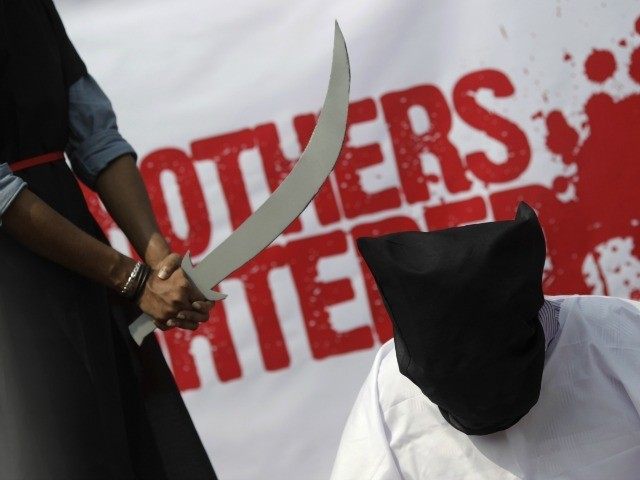The government of Saudi Arabia executed three people on Tuesday via beheadings. The total number of beheadings in the strict Muslim country totals 48 in 2015 already, more than half the total beheadings in 2014.
The government beheaded 87 people in 2014. Human rights organization Amnesty International claimed the country “is well on track to far surpass its previous annual execution records,” as on March 11, Saudi Arabia executed three people to put the number at 44. Only eleven people were put to death between January and March in 2014.
“This unprecedented spike in executions constitutes a chilling race to the bottom for a country that is already among the most prolific executioners on the planet,” declared Said Boumedouha, Deputy Director of Amnesty International’s Middle East and North Africa Programme.
On March 11, officials executed men from Saudi Arabia, Syria, and Yemen for drug-related offenses. Of the three men on Tuesday, a Pakistani national was executed on drug charges.
“The fact that around half of the executions carried out so far this year were for drug-related offences contradicts the Saudi Arabian authorities’ claims at the United Nations Human Rights Council that the death penalty is imposed for only the most serious crimes,” continued Boumedouha. “This claim is far from the truth, as international standards are clear that this means crimes involving intentional killing.”
Saudi Arabia implements Sharia law. Death penalty offenses include rape, murder, armed robbery, apostasy, and drug trafficking. Two Saudis were also put to death on Tuesday, but not for drugs:
Najr bin Farajal Azmial Otaibi, a Saudi, was put to death in the western city of Taif for stoning and caning to death another man, the ministry said in a statement carried by the official Saudi Press Agency.
Another Saudi, Moeid bin Ali bin Moeidal Saadal Qahtani, was beheaded by the sword in Eastern Province for gunning down a man.
The ministry added that the execution of both Saudis was delayed until the children of their victims came of age to decide whether the sentences should be carried out.
But the high number of executions under the new leader, King Salman, could be to show citizens that he can keep people safe and to show off his power.
“The Saudi authorities want to show everyone they are strong, people can rely on them to keep the security and the safety in the kingdom,” a source told AFP.
In February, the Saudi government lashed out at critics who compared them to the Islamic State (ISIS/ISIL), who also behead their victims in public. The country received loud international backlash after a video surfaced of three men beheading a woman in the middle of Mecca. They dragged her out into the street as she screamed her innocence. Interior Ministry spokesman Major General Mansour al-Turki told NBC News the punishments are not similar, since the Islamic State “has no legitimate way to decide to kill people.”
“When we do it in Saudi Arabia, we do it as a decision made by a court,” he explained. “The killing is a decision, I mean it is not based on arbitrary choices, to kill this and not to kill this. When you kill somebody without legitimate basis, without justice system, without court, that is still a crime whether you behead them or kill [them] with a gun.”
Middle East news site Middle East Eye tweeted a picture that shows similarities between Islamic State and Saudi Arabia punishments.
Documents show IS & Saudi Arabia prescribe near-identical punishments for crimes http://t.co/ZoVVUqeHMn #ISIS #Saudi pic.twitter.com/kUEXqXCJiv
— Middle East Eye (@MiddleEastEye) January 20, 2015
In August 2014, Amnesty International reported the Saudi kingdom executed a person “almost every day” during the month. The charity claimed the kingdom carried out 22 executions “between August 4 and August 22, compared to 17 executions between January and July” of 2014. In total, the kingdom executed 87 people in 2014, compared to the 78 in 2013.

COMMENTS
Please let us know if you're having issues with commenting.